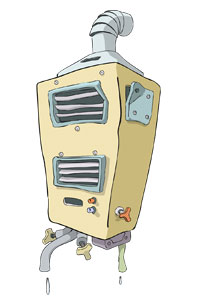A home warranty sounds like a great idea. It gives you peace of mind, especially if you live in an older home but be aware that most home warranties are written to favor the warranty company. They may not cover everything you expect.

When it comes to home warranties one size certainly does not fit all. You need to take into consideration the age and state of your home and your own particular aversion to risk. If the worst case happens a warranty may save you thousands but for some home owners they could be a total waste of money. How can you know?
Here are five things to bear in mind.
The age of the house
The first thing to consider when looking at home warranties is how old is your home? If you are buying a brand new home the home builder will offer a warranty on the home itself and many, if not all, of your appliances should be under a manufacturers warranty.
You will obviously have more reason to look at home warranties if you are moving into an older home.
All appliances have a life expectancy, in the case of water heaters and HVAC systems this is usually prominently displayed (see below for more details). But for smaller items you may have to make a trip to the manufacturer’s web site to get that information.
See the seven hidden benefits of buying a home
As a rule of thumb items like ranges and refrigerators last anywhere from 13-18 years while washers and dryers last about 10-11 years. The handy chart here gives you a good idea of the life span of most appliances:
TIP: If you are buying new appliances it’s a good idea to buy them with a credit card as many companies will offer a warranty on items purchased with their card. You can check out which are the best cards for extended warranty here But beware some extended warranties match the warranty to a particular period of time, while others add a set amount of time to the end of the original warranty. There are nearly always exclusions and maximum coverage limits. Extended warranty protection covers a wide variety of items, whereas some credit cards only cover specific items. As always, check the agreement and visit the site for more information.
The cost of the warranty.
It goes without saying that you hope to spend less on the warranty than on the cost of repairs. There are three basic kinds of warranty; 1. you can cover a single appliance, 2. all your appliances or 3. your appliances along with associated plumbing and electrical. Each has it’s cost-benefits but owners of older homes should look closely at the last option.
 The price you pay will obviously depend on the plan you chose but it may surprise you to know that it can also depend on your geographic location. American Home Shield has a plan that covers most major appliances. This plan costs around $500 in Ohio but costs over $900 in Westchester, New York. The differences within California are also noticeable with major metropolitan areas like LA being the most expensive.
The price you pay will obviously depend on the plan you chose but it may surprise you to know that it can also depend on your geographic location. American Home Shield has a plan that covers most major appliances. This plan costs around $500 in Ohio but costs over $900 in Westchester, New York. The differences within California are also noticeable with major metropolitan areas like LA being the most expensive.
Also be aware that even though your appliance is covered you may still incur additional expenses, in the form of co-payments to the contractor who comes to fix your issue. This can be anywhere from $60 to $125 and this money will need to be paid on the spot.
It’s 2020 do I really need a realtor?
Know what your agreement covers
The BBB says that the majority of complaints it receives about home warranties stem from the customer not understanding the extent of their coverage. Make sure you read the agreement carefully. It’s not unusual for a refrigerator to be covered but not an ice maker or a policy that covers a hot water system may not extend to the tank itself.
On a related note it is always a good idea to maintain your appliances and systems. As they say, an ounce of prevention is worth a pound of cure. A little regular care can not only extend the shelf life of your appliances but also reduce your worry and repair costs.
Know the limitations of your plan
Is there a maximum amount that the company will pay, is this calculated per month, per year? Is there a deductible?
Self insurance may be worth considering.
Many reputable companies (including Consumer Reports) suggest that instead of buying a home warranty you set the same money aside every month and put it in a savings account dedicated to home repair and maintenance. This has the benefit of earning interest and it gives you incredible flexibility when it comes to spending the money. You will have the option of calling around and finding the lowest bid on any work you need. Even if the vendor is not recommended by your warranty company.





